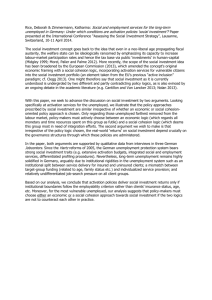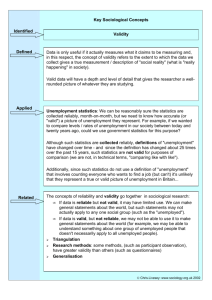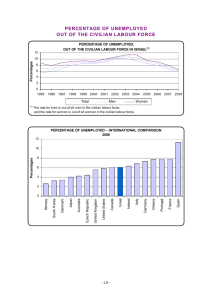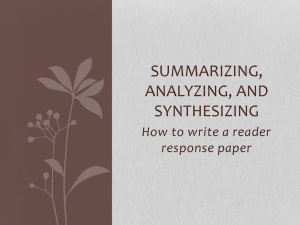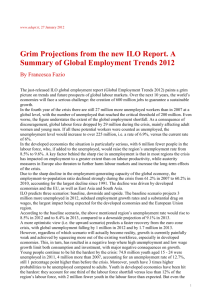Social Welfare Policy and 'the Unemployed': A Case Study in the
advertisement
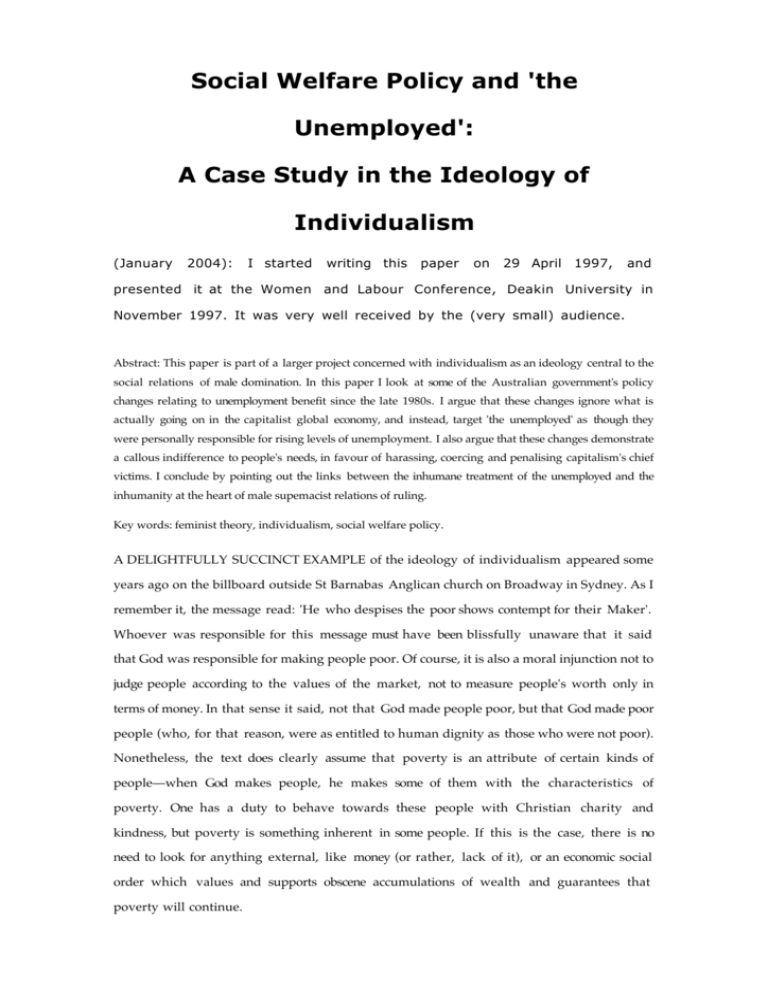
Social Welfare Policy and 'the
Unemployed':
A Case Study in the Ideology of
Individualism
(January
2004):
I started
writing this
paper
on
29 April 1997,
and
presented it at the Women and Labour Conference, Deakin University in
November 1997. It was very well received by the (very small) audience.
Abstract: This paper is part of a larger project concerned with individualism as an ideology central to the
social relations of male domination. In this paper I look at some of the Australian government's policy
changes relating to unemployment benefit since the late 1980s. I argue that these changes ignore what is
actually going on in the capitalist global economy, and instead, target 'the unemployed' as though they
were personally responsible for rising levels of unemployment. I also argue that these changes demonstrate
a callous indifference to people's needs, in favour of harassing, coercing and penalising capitalism's chief
victims. I conclude by pointing out the links between the inhumane treatment of the unemployed and the
inhumanity at the heart of male supemacist relations of ruling.
Key words: feminist theory, individualism, social welfare policy.
A DELIGHTFULLY SUCCINCT EXAMPLE of the ideology of individualism appeared some
years ago on the billboard outside St Barnabas Anglican church on Broadway in Sydney. As I
remember it, the message read: 'He who despises the poor shows contempt for their Maker'.
Whoever was responsible for this message must have been blissfully unaware that it said
that God was responsible for making people poor. Of course, it is also a moral injunction not to
judge people according to the values of the market, not to measure people's worth only in
terms of money. In that sense it said, not that God made people poor, but that God made poor
people (who, for that reason, were as entitled to human dignity as those who were not poor).
Nonetheless, the text does clearly assume that poverty is an attribute of certain kinds of
people—when God makes people, he makes some of them with the characteristics of
poverty. One has a duty to behave towards these people with Christian charity and
kindness, but poverty is something inherent in some people. If this is the case, there is no
need to look for anything external, like money (or rather, lack of it), or an economic social
order which values and supports obscene accumulations of wealth and guarantees that
poverty will continue.
Social Welfare Policy and ‘the Unemployed’ - Denise Thompson
This construct of 'the poor' has a dated, nineteenth-century ring to it, conjuring up images of
the workhouse and poor relief, revulsion at the feckless idleness of the undeserving, and
charitableness towards the deserving. But such attitudes have by no means vanished—they
surface with only minor variations whenever the chief victims of the system become too
numerous and visible to be ignored. Instead of 'the poor' we now have 'the unemployed', a
category of persons whose idleness is self-evident since it is built into the word used to
designate them. To be 'unemployed' is by definition to be a passive, lazy, shiftless scrounger
unworthy of membership in 'the community'. (For an account of the lies perpetrated by the
media, and in particular the Murdoch press, in drumming up the 'dole bludger' myth in the
late 1970s, see: Windschuttle, 1980: chapter 8).
Such beliefs and attitudes are not just a matter of personal opinion, since they structure and
inform government social welfare polices. Endless references to 'the community' are used to
justify policies and practices towards the unemployed. For example, in a paper presented to
the Fourth National Social Policy Conference in 1995, two DSS1 employees asserted that
there was 'community support' for 'work tests' for the unemployed. They went on to say: 'one
need only to peruse the letter and opinion columns of major daily newspapers or listen in on
the more popular talk-back radio programs, if in doubt'. (Powlay and Rodgers, 1995: 161) Or
to take another example: according to a 'Message from Senator the Hon Jocelyn Newman
Minister for Social Security' in the May 1996 issue of the DSS newsletter 'Update' (which is
distributed periodically with the fortnightly application for payment forms): 'The
community needs to be reassured that the system is not being used by people who have no
entitlement to assistance'. (Department of Social Security, 1996: 1)
Lest it be thought that this appeal to what 'the community' wants is confined to the regime
of the Howard government,2 take the following example from the 1988 Social Security
Review, undertaken under the aegis of the Labor Government:3 'There is no doubt', states the
Review, 'that the increase in the rate and duration of unemployment and community
perceptions of this increase have been accompanied by a reduction in the perceived
legitimacy of the unemployment benefit program'. (Cass, 1988: 4) In other words, the more
people who become unemployed, and the longer they remain unemployed, the less 'the
community' believes that it is right and proper to pay them unemployment benefits. The
2
Social Welfare Policy and ‘the Unemployed’ - Denise Thompson
peculiar logic of this assertion is explained by the last phrase in the preceding paragraph
referring to 'a consequent increase in social security expenditures'. What the Review is
telling us is that income support for the unemployed is becoming too expensive, and 'the
community' does not want to pay for it.
Obviously, this 'community' does not include the unemployed themselves, who averaged just
under 850,000 people in the 12 months to May this year. (Henderson, 1997)4 Since 'income
support' is around $160 a week for a single person, i.e. $8,320 a year, the unemployed, and
especially the long-term unemployed, are not in a position to pay for anything very much at
all. This ideological and actual exclusion of the unemployed from 'the community' is
underlined by the Labor government's 1994 White Paper, Working Nation. Under the
heading 'Greater obligation on job seekers', the paper says: 'The public consultations of the
Committee on Employment Opportunities revealed a strong community concern that
unemployed people are making insufficient effort to find employment … there is strong
community support for increased penalties for job seekers who refuse to seek work or who turn
down reasonable job offers'. (Commonwealth of Australia, 1994: 125) Once again, this is not a
'community' of the unemployed, who are hardly likely to agree that they deserve increased
penalties. Moreover, as the Sydney Welfare Rights Centre has pointed out, the White
Paper produced no evidence in support of its claims about what 'the community' believed.
Nor, says the Welfare Rights Centre, did it produce any evidence 'that the public was
aware of how severe the existing penalties were [already]', or that increased penalties were
necessary, or that they would be effective, or 'that the previous penalties were insufficient
or were not doing the job'. (Mullins and Raper, 1996: 23)
Increasingly punitive policies towards the unemployed, introduced in Australia since the
late 1980s, are saying in effect that the unemployed are personally to blame for
unemployment. The Australian government and its instrumentalities do acknowledge other
causes of unemployment. The 1988 Social Security Review referred to 'profound labour
market and economic changes', 'reduced levels of economic growth and employment growth'
and 'insufficient aggregate labour demand'. (Cass, 1988: 2, 3) And the Working Nation
White Paper contained a number of proposals for assisting industry to create jobs. But as one
expert in the field has commented: 'Working Nation, it has rightly been said, was a review
3
Social Welfare Policy and ‘the Unemployed’ - Denise Thompson
of policies for "job readiness" rather than job creation'. (Smyth, 1995: 217) In other words,
Working Nation's chief focus of attention was the unemployed, not business and industry.
Moreover, it is only the unemployed who are expected to be 'active', and who are coerced and
penalised. There are no government sanctions for employers, including the government itself,
who contribute directly to unemployment by reducing their staffing levels.
There is, of course, nothing new in the belief that the unemployed are to blame for
unemployment. Unemployment benefit has always been conditional upon what the 1988
Social Security Review called 'the crucial concept of active job search'. (Cass, 1988: 1) Before
the introduction of the unemployment benefit by the Commonwealth government in 1945,
access to 'poor relief' or, as it was called in Australia in the 1930s, 'the sustenance' ('susso'),
was dependent on a multitude of degrading obligations limited only by the sanctimonious
imaginations of the administrators. Since 1945, there have always been penalties for
'failing the work test'. Beneficiaries could have their payments stopped for 'refusing an
offer of suitable employment', and they could be refused payment if they left work
'voluntarily' or were fired for 'misconduct'. In the late 70s, the Fraser government imposed
harsher conditions on the unemployed, as its response to the rapidly rising unemployment
caused by the recession of the early 70s. (Windschuttle, 1980: chapter 9)
But the changes introduced since the late 1980s have substantially increased the level of
monitoring of the unemployed, despite all the evidence that unemployment is not caused by
'the unemployed' and hence cannot be cured by focusing on them. By increasing the number of
bureaucratic requirements for which the unemployed can be breached, these changes have
increased the harassment. Not that the ideological rhetoric acknowledges this. Instead we
are treated to a relentless stream of jargon—'the active society', 'reciprocal obligations',
'government assistance', 'labour market programs', 'job compacts', 'job readiness', 'case
management', 'activity test', etc.— designed to disguise the fact that these policies amount
to nothing more than demeaning obligations imposed on those already demoralised by
unemployment. For all the talk about 'government assistance' (Powlay and Rodgers, 1995:
162) and 'labour market programs whose aims are to facilitate job search and job placement,
and to increase skills through training and retraining programs' (Cass, 1988: 5), these
policies have multiplied the number of occasions for withholding payment.
4
Social Welfare Policy and ‘the Unemployed’ - Denise Thompson
Take, for example, the shift from the traditional 'work test' to an 'activity test'. According
to the 1988 Social Security Review, this shift was necessary because 'unemployment benefit
has increasingly been perceived as a "passive" form of income support, and its active purpose
and potential have been hidden, and indeed given insufficient emphasis'. (Cass, 1988: 4 emphasis in the original) Or, to put it more crudely, our old friend 'the community' was sick
of dole bludgers lying around doing nothing. The Review also mentioned 'profound structural
labour market changes', but since the unemployed cannot rationally be held responsible for
these, it is unlikely that increasing 'activity' on their part will have any effect on these
'labour market changes'.
And these increased 'activities' are compulsory since failure to comply carries the heavy
penalty of reduction or withdrawal of income. In the DSS' own words: 'It's important for you
to meet the standards set out in the activity test. If you don't, your allowance may be [sic—it
always is] stopped'. (DSS, 1997) Until 1 July this year [1997], any 'failure to meet the
standards' was penalised by immediate and complete withdrawal of income for periods
ranging from two weeks to infinity (since 'allowees' could, and still can, incur one penalty
period after another). (Mullins and Raper, 1996) Since 1 July, and as a DSS response to
submissions by the Welfare Rights Centre protesting the harshness of these penalties, this
has been changed. A first offence now attracts a penalty of a rate reduction of 18% for 26
weeks, a 24% reduction over the same period for a second offence, and a non-payment period
of eight weeks for third and subsequent offences. (DSS, 1997)
While these changes are less harsh than no income at all, they are still draconian, given
that even the full 'allowance' is not enough to live on. Moreover, these 'offences' are
appallingly easy to commit. The 'standards' the unemployed are expected to adhere to
amount to nothing less than making the impossible compulsory. The impossible is obliging
people to 'actively look for work' when there isn't any. Every applicant must write on their
fortnightly application for payment form the names and phone numbers of two employers
they have approached for work in the last fortnight.5 Those who have been issued with a
'jobseeker diary' must write down up to eight employers they have contacted in a fortnight.
Although
the
powers-that-be
acknowledge
that
people become discouraged and
demoralised at constant failure to obtain work, their response is to step up the harassment in
5
Social Welfare Policy and ‘the Unemployed’ - Denise Thompson
the guise of what is euphemistically termed 'measures to assist the long-term unemployed'
(OECD, 1988; Commonwealth of Australia, 1994), rather than leaving people alone to cope
with unemployment in their own way.
Failing 'to actively look for work' constitutes an 'activity test breach'. One can 'fail the
activity test' by not filling in the jobseeker diary, not attending a job interview or not
complying with a 'case-management activity agreement'. (This latter is not an 'agreement'
at all, since it is not a contract between equals, but a coercive imposition). One can also 'fail
the activity test' by refusing 'to go on an approved training course', refusing 'a suitable job
offer', leaving work 'voluntarily' or being fired for 'misconduct'. People can also be penalised
for failing to attend a DSS, CES or case management interview, a so-called 'administrative
breach'. Failing to keep an appointment may not be the right thing to do, but it hardly
warrants a reduction in an already meagre income. (Raper, 1997) People have been penalised
for failing to turn up for an appointment through no fault of their own, i.e. they had a car
accident on the way, or for turning up 20 minutes late. Moreover, keeping appointments with
DSS is not helped by DSS' own inefficiency. It frequently happens that notifications of
appointments arrive in the mail after the date of the interview. (According to a member of
DSS' counter staff, this is because all the letters originate from Canberra). But whatever the
reasons, the end result of this proliferation of occasions for withholding payment from the
unemployed is budgetary savings for the government.
It may be that social welfare systems are becoming too expensive for nation states to
maintain, although the petty-minded meanness and callous indifference to people's welfare,
and the eagerness with which governments comply with the dictates of monetarist economic
policies, suggest that something more sinister and deliberate is at work here. It is difficult to
escape the conclusion that the purpose of these policies is to dismantle the social security
system by stealth, at least in relation to unemployment benefits, by making it increasingly
difficult, and in many cases impossible, for people to continue making claims on the system.
The reasons for falling tax revenues do not lie with 'the unemployed' (or migrants, or
Aboriginal people, or the 'aging population', a category of people whose popularity as
scapegoats is growing).
6
Social Welfare Policy and ‘the Unemployed’ - Denise Thompson
What is really happening is what is euphemistically known as 'economic restructuring'.
This is a euphemism (and ideology) because it masks the real horror of what is going on.
Capitalism (and not the blander terms 'the economy', 'private enterprise' or 'business') is
rearranging itself with the aid of technology, and it does not need as much labour power as it
used to (at least in the West). The process called 'globalisation' (another euphemism)
involves multinational enterprises increasingly bypassing the skilled, organised and largely
male labour forces in the metropolitan centres of the West, in favour of more direct
exploitation of the 'cheaper' (read: slave), and largely female, labour in the 'Third World'.
The much touted increasing work force participation of women in the 'developed' countries is
a sham, since it involves mainly part-time, casual, unorganised and low paid work in the
'service' industries, with no security, no protection and no possibility of advancement. In the
UK women's full-time work force participation is lower now than in the 1950s. (Land, 1995:
9—citing Catherine Hakim (1993) 'The Myth of Rising Female Employment' Work,
Employment and Society 7(1), March).
The reasons for falling tax revenues in the 'developed' nations lie with 'economic
restructuring' and 'globalisation', with a rich capitalist ruling class increasingly outside the
fiscal reach of nation states. The Australian government's exclusive focus on 'the
unemployed' serves to deflect attention from the real culprits—a capitalist economic system
whose chief value is profit, governments enthusiastically embracing the values of the
market, and the failure of nation states to commit themselves to policies informed by the
principle of the redistribution of wealth.
But what can anyone do in the face of an immeasurably wealthy ruling class, ever more
shameless in defence of its vested interests, with less and less sense of its social
responsibilities, slavishly pandered to by nation states? The only possible response would
appear to be helpless rage or weary cynicism. But although it may not change anything very
much, it does make a difference to acknowledge the real causes of the problems and refrain
from blaming the victims. The 'ruling class' is not only a category of individuals who profit
from an unjust social order at others' expense, what Bob Ellis so delightfully called the
'sadomonetarists' in an article in the Sydney Morning Herald earlier this year. The ruling
class certainly consists of human beings, largely male but increasingly aided and abetted by
7
Social Welfare Policy and ‘the Unemployed’ - Denise Thompson
what Andrea Dworkin called 'domesticated females'. These people who make decisions
affecting the lives of millions are responsible for what they do, even if it is impossible to
make them accountable. The ruling class is also those ideological principles which give
meaning, value and reality to domination. And anyone can refuse to comply with the
ideologies of domination, by refusing to see the world and act within it in ways which
maintain social relations of ruling by ignoring their existence.
What does all this have to do with feminism, given that women are hardly mentioned?
That depends on how feminism is defined. I would argue that feminism ought not to be
defined in terms of women anyway, or at least not in the first instance. Rather, feminism is
the struggle against male domination, that is, the struggle against social conditions
structured around the principle that only men count as 'human'. Women are vitally concerned
with this struggle because that principle and the social arrangements which owe it
allegiance depend on the dehumanisation of women. Hence the struggle against male
supremacy is also a struggle for a human status for women outside male definition and
control. But focusing only on women, without first acknowledging the source of women's
problems in the social relations of male supremacy, renders male supremacy invisible and
makes it seem as though women themselves are the problem. It is itself a form of ideological
individualism because it is a focus on certain kinds of individuals rather than on the social
system which victimises them. I am not saying that feminism ought not to focus on the harm
and damage done to women. It can and it should. I am saying that it is essential to
acknowledge male supremacy at the same time. Otherwise it looks as though victimisation
is something inherent in women because the social system has vanished from sight.
If feminism, then, is the struggle against a social order of male domination, it is crucial that
feminism develop a consciousness of what male domination is. While it is centrally the
subordination of women to men, to confine it only to relations between women and men, or
worse, only to women, is to reduce male domination to nothing but the attributes of particular
kinds of individuals. It is colluding with one of the chief ways in which domination is
denied, that is, by interpreting the social as nothing but the interactions of already
constituted individuals. It ignores the social system of meanings and values which maintains
domination as business-as-usual, and populates the world with independent agents who only
8
Social Welfare Policy and ‘the Unemployed’ - Denise Thompson
have themselves to blame for failure (or who can smugly congratulate themselves on their
success). In contrast, starting from the realisation that the social arrangements of domination
are inexorably oppressive, enables us at the very least to avoid blaming the victims and
exonerating the perpetrators.
It also enables us to avoid unrealistic expectations of what can and can't be done. Recognising
that a world which excludes women, or includes them only as ancillaries loyally devoted to
the values of competitive masculinity, enables us to recognise that it is a world divorced
from genuine human values. It is an inhuman world of callous indifference to human
suffering, of standard violations
of human rights
and dignity. A world which
systematically forgets women is a world devoid of any sense of social responsibility. Once
that crucial social amnesia has severed the primary connection with women, inhumanity
becomes the norm. What is being done to the unemployed is just one aspect of the normal
inhumanity at the heart of the social relations of male supremacy.
Notes
(Added January 2004)
1. The Australian Department of Social Security, subsequently re-named
'The
Department
of
Family
and
Community
Services'
(FaCS)
with
'Centrelink' as the section dealing with the unemployed.
2. The overtly, right-wing neo-liberal government, called 'The Coalition' or
'The Liberal/National Party'.
3. Supposedly the political party of the left, but in fact no less committed
to the neo-liberal agenda than their political opponents.
4. By November
2003,
the official
unemployment
rate
was 5.6%
or
627,000 persons. But as the Australian Council of Social Services (ACOSS)
pointed
out,
unemployment
this offical
because
figure
seriously
it excludes
underestimates
the underemployed
the
level
of
and those not
currently looking for work or able to start immediately. When these are
included, the unemployment
rate more than doubles,
to over 12% or
1,343,000 persons (ACOSS, 2003).
5. This was later increased to ten (10), where it remains at the time of
writing. It's not easy to find out about this requirement, nor any of the
other onerous obligations
imposed
on the unemployed,
don't appear on the Centrelink website.
9
because
they
Social Welfare Policy and ‘the Unemployed’ - Denise Thompson
References
ACOSS (2003) Hidden Unemployment in Australia ACOSS Paper 131
http://coss.net.au/news/upload/130_hidden_unemp_full.pdf
Cass, Bettina (1988) Social Security Review—Income Support for the Unemployed in
Australia: Towards a More Active System Commonwealth of Australia, Canberra: AGPS
Commonwealth of Australia (1994) Working Nation: Policies and Programs Canberra: AGPS
Department of Social Security (1996) 'Update' Canberra, May
Department of Social Security (1997) 'Activity Test Update' Canberra, July
Henderson, Ian (1997) 'Dole Queues to Lengthen as Cuts Bite', The Weekend Australian, May
17-18, p.5
Land, Hilary (1995) 'Rewarding Care: A Challenge for Welfare States', in Saunders and
Shaver, eds, vol.2, pp.1-24
Mullins, Carla and Raper, Michael (1996) Penalties and Poverty—I Beg Your Pardon! An
Analysis of the Severity, Administration and Impact of the Penalties Regime in the
Australian Social Security System Surry Hills, Sydney: The National Welfare Rights
Centre
OECD (1988) Measures to Assist theLong-Term Unemployed: Recent Experiences in Some
OECD Countries Paris: OECD
Powlay, John and Rodgers, Kate (1995) 'What's Happened to the Work Test?' in Saunders
and Shaver, eds, vol.1, pp.161-72
Raper, Michael (1997) 'Forgetful Unemployed Face Harsh Penalty' Letters, The Australian,
26 February, p.12
Saunders, Peter and Shaver, Sheila, eds (1995) Social Policy and the Challenges of Social
Change: Proceedings of the National Social Policy Conference, vols 1 & 2, 5-7 July,
Sydney: Social Policy Research Centre, University of NSW
Smyth, Paul (1995) 'Reintegrating Social and Economic Policy: Towards a New Australian
Settlement', in Saunders and Shaver, eds, vol.1, pp.209-27
Windschuttle, Keith (1980) Unemployment: A Social and Political Analysis of the Economic
Crisis in Australia Ringwood, Victoria: Penguin Books Australia Ltd
© Denise Thompson 1997
10
